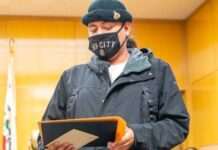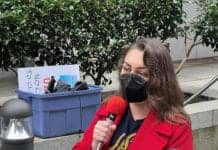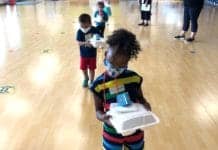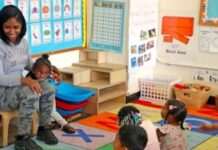
by Daphne Young
Just before the July 1 deadline, the San Francisco Board of Education unanimously approved the $1.16 billion budget for the 2021-22 school year.
SFUSD expects to receive $140 million in federal stimulus funding that will help welcome students back with increased academic and wellness support in the fall and also help address the district’s budget deficit of $100.2 million.
“We are incredibly grateful to the voters of San Francisco, who consistently show their support for public education,” said SF Board of Education President Gabriela Lopez. “Thanks to their generosity, our public schools offer more arts and music, physical education, library services and student support than any other large urban school district in the state,” added Lopez.
Because of PEEF, every San Francisco Unified School District (SFUSD) school has a library and a credentialed librarian, and every student has access to a nurse or social worker.
SFUSD had a July 1 deadline to send its approved budget, which included the $75.8 million 2021-22 Public Education Enrichment Fund (PEEF) Expenditure Plan, to the state of California. This spending plan for voter-approved funds supports many programs in the City’s public schools, including sports, libraries, arts and music programs.
So, because of PEEF, every San Francisco Unified School District (SFUSD) school has a library and a credentialed librarian, and every student has access to a nurse or social worker. “Being at the forefront of providing school-based wellness programs has never been more important,” said Board of Education President Lopez.
For a little background on PEEF, the Public Education Enrichment Fund was established after San Francisco voters passed a charter amendment in 2004 to provide taxpayer money to help supplement programs in the city’s public schools. The fund was reauthorized by San Francisco voters in 2014 to extend PEEF through 2041.
The newly approved SFUSD Board approved budget also includes $93.5 million in parcel taxes from the Quality Teacher and Education Act (QTEA), as approved by San Francisco voters in 2008, and the Fair Wages for Educators Act (FWEA), as approved by San Francisco voters in 2020.

Both of these measures help make San Francisco teacher salaries competitive with those in surrounding school districts. Plus, the measures provide financial incentives for teachers to work at schools with historically high turnover and teach in hard-to-fill subject areas such as high school math.
“As we emerge from the pandemic and prepare to return all students to in-person learning in the fall, we are prioritizing programs for our highest need students,” said SFUSD Superintendent Dr. Vincent Matthews. “We are very glad for the federal stimulus and state grants as our costs have continued to rise,” he added.
“This is a much-needed short-term remedy to support and stabilize our students as they return from distance learning and pandemic related challenges. While we are prepared to do as much as possible for students this year, we are also continuing to work toward a multi-year plan to balance our budget,” said Matthews.
SFUSD Chief Financial Officer Meghan Wallace tells us that “to tackle this fiscal cliff, district staff will continue their work with Zero-Based Budgeting as a means to establish a path towards fiscal sustainability over the next five months.”
Each year, parents, students, labor partners and community members are given the opportunity to provide feedback and help shape SFUSD’s Local Control and Accountability Plans (LCAPs).
Wallace goes on to say, in a statement prepared by SFUSD, “By allowing another year to sustain our investments in our students, it is shadowed by the short-term nature of several significant funding sources and a looming $112 million deficit in FY 2022-23.”
The Zero-Based Budget process aims to prioritize district spending in three categories: base package services, district priorities and service enhancements. Budget reductions would be made by scaling back service enhancements and identifying ways to configure the delivery of base package and district priority services more efficiently, according to Wallace.
But school district officials also caution that the new state and federal funds may only be short-term relief for an ongoing structural deficit facing SFUSD and many other California school districts.
Even before the pandemic began, SFUSD’s revenues grew slowly while the cost of running the seventh largest school district in the one of the costliest, yet high poverty cities in the state grew exponentially and fund balance declined. Plus, with school closures and the rollout of distance learning to contain the spread of COVID-19, SFUSD struggled to meet the educational crisis with constrained resources.
In addition, school districts are required to adopt Local Control and Accountability Plans (LCAPs), which are plans to show how districts will spend the supplemental funds to support their high-needs students. Each year, parents, students, labor partners and community members are given the opportunity to provide feedback and help shape SFUSD’s LCAP.

California’s LCFF (Local Control Funding Formula), enacted in 2013-14, replaced the previous kindergarten through 12th grade revenue limit funding methodology and gave school districts serving high-needs students more funds in the form of supplemental and concentration grants, based on the number and percentages of high-needs students they serve.
The district’s budget also reflects an increase in funding from the state: SFUSD expects to receive $551.3 million from the Local Control Funding Formula (LCFF), California’s primary source of state education dollars. This funding in SFUSD’s unrestricted general fund is a $20 million (3.8 percent) increase from last year. The majority of SFUSD’s total operating budget consists of the Unrestricted General Fund, which includes funds for school-based supports, such as employee salary and benefit costs.
The next largest portion of the budget, the Restricted General Fund, amounts to 38 percent of the overall budget. Restricted funds are only to be spent for designated purposes, such as PEEF and the Quality Teacher and Education Act (QTEA), which helps fund increased compensation and professional learning for educators.
What parents need to know is that in order for SFUSD to receive the various funds mentioned above, a “full reopening plan and budget” had to be agreed upon and approved by the board. And, while many parents may disagree with some elements of SFUSD’s reopening plan for the fall of 2021-22, some kind of cohesive plan, along with a budget, was necessary in order for SFUSD to receive grants and funds being offered by the state for the upcoming school year.
For more information about the SFUSD Short-term Budget for 2021-22, visit sfusd.org.
Daphne Young is the Education Reporter at the San Francisco Bay View National Black Newspaper. The Chicago native is an award-winning journalist who’s covered news for radio and TV stations around the country. She attended San Francisco State University and is a member of Delta Sigma Theta Sorority, Inc. If you have an education story that you’d like to see the Bay View cover, please contact Daphne by email: education@sfbayviewnews.wpenginepowered.com.

 Store
Store












